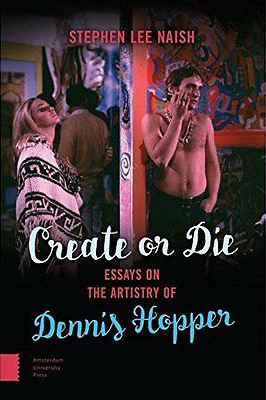While perhaps best known as a compelling screen actor with a cult following, Dennis Hopper’s influence extended into photography, music, visual art and advertising. In Create or Die: Essays on the Artistry of Dennis Hopper, Stephen Lee Naish not only expands our understanding of his artistic reach, but also offers an illuminating example of how to trace a catalogue of unsettling enjoyments that collect around one figure – in this instance, the enigmatic Hopper, writes Alfie Bown.
Create or Die: Essays on the Artistry of Dennis Hopper. Stephen Lee Naish. Amsterdam University Press. 2016.
 The University of Enjoyment
The University of Enjoyment
French psychoanalyst Jacques Lacan started his project from the central belief that the discourses of structuralism and other philosophical models had always failed to account for one thing: enjoyment. Whilst the importance of enjoyment can hardly be overestimated culturally, socially and politically, philosophy seems never to properly grasp its functions. The university, to my mind, is the guiltiest party, and perhaps this explains why it has always worked so hard to keep Lacan on its fringes. Over the past few decades the university has become master of discussing readers, viewers, authors and texts, but it has never been able to explore – to any satisfying degree – the multiple forms of enjoyment which connect and disconnect all these things with each other.
Stephen Lee Naish’s book also comes from the fringes of the university, put out as part of the experimental Amsterdam University Press film studies range but not written by an employee of an academic institution. Here its direct connection to Lacanianism comes to an end, so I will leave discussions of psychoanalysis behind. Create or Die: Essays on the Artistry of Dennis Hopper does, however, offer a start when it comes to speaking about enjoyment, as well as something of a model for how academic studies of all things enjoyable might begin to improve themselves. Naish – a writer of great skill who has published on everything from US politics to Kanye West – would be made an immediate Honorary Chair of the Enjoyment Studies degree to come.
Naish writes in the introduction that if his own voice creeps into the text, then ‘this has been deliberate’. By making himself visible as the experiencing – and enjoying – subject, Naish avoids what is so common in the university: elevating oneself to the position of the subject who understands the text, and who apparently understands the enjoyment of others when confronted with it. He ensures that his book is the history not so much of his chosen subject, but of the relationship between the subject and the experiences of those engaging with that subject. At the same time, Naish continually provides analysis, critique and interpretation, never slipping into the anecdotal and entirely personal. Instead, the book reads academically and has all the strengths of a well-researched film studies text, but with the additional willingness to put the experience of his own subjectivity at the centre and ask what this further shows us about the book’s subject matter and how it is experienced.
 Image Credit: Dennis Hopper photographed by Hartmut S. Bühler in front of the Kunsthalle Düsseldorf in 1988 (Hartmut S. Bühler CC BY SA 4.0)
Image Credit: Dennis Hopper photographed by Hartmut S. Bühler in front of the Kunsthalle Düsseldorf in 1988 (Hartmut S. Bühler CC BY SA 4.0)
That subject matter is the enigmatic and irrepressible Dennis Hopper, himself the perfect subject for a study of how and why we enjoy the things we do. Hopper, Naish shows, has produced a quite remarkable range of reactions in his various audiences. As a cult figure, perhaps based most famously on his performance in, and direction of, Easy Rider (1969), Hopper has been enjoyed as someone with whom his audience very much identifies (at least the young ones with a newly found passion for motorcycles and the open road when they came out of the cinema). His equally famous performance in David Lynch’s Blue Velvet (1984) as the violent sexual predator and rapist Frank Booth has been enjoyed very differently: as a repulsive performance of frightening sexual fantasy which we are disgusted by, yet cannot turn our eyes away from. His bizarre and tiny but pivotal role in Apocalypse Now (1979) is different again, and may force us to confront the enjoyment of madness itself. In a more personal sense, Hopper has also been enjoyed as both a Hollywood icon and as someone rejected and kept out of Hollywood for over a decade as a result of an ingestion of drugs and booze to rival any celebrity addict, which enamours us to the subject in yet another way.
Naish’s book is both the study of Hopper as an individual and a study of a set of texts. Whilst it is the actors who draw people to the cinema, films are usually categorised in academic studies by either director, date of release or genre. By writing on Hopper, Naish breaks these conventions and gives himself a fresh pool of texts which are all connected by Hopper, but which do not fit comfortably together according to the organising structures already in place in the university. Therefore, these texts collectively resist telling us what the university already knows (about the time or genre, for example), and instead force Naish into new conclusions about what connects them. Furthermore, Hopper is not the ‘author’ of these texts per se – although of course he influences their meaning – so attempts to explain the texts by intentionality would be fruitless. Instead, Naish sets himself a much harder task to answer the problem that is Hopper.
Credit is due for the scope of the book here as well. Where many writers, the present one included, tend to select only the examples which perfectly bear out the points they want to make, Naish simply includes it all. The book covers nearly every appearance of Hopper on screen, almost all of his directed productions, his music, his art, his photography and (in a particularly brilliant chapter) all the adverts, no matter how commercial and ostensibly uninteresting, that he appeared in.
What comes out of it all, for this reader at least, is less a full portrait of a man – which I doubt was ever Naish’s ambition – than a catalogue of unsettling enjoyments produced in a range of mediums across many decades, but by one individual. Naish notes that Hopper saw himself as a social critic whose films made the social ills of America visible. Hopper said that he felt he had to simplify things to reach an audience; but there is no need for Naish to do the same, because this is a book without pretension and superfluity that approaches its subject matter in a simple and direct way that does not require any academic training in the traditions of film studies to follow. At the same time, it achieves something much harder: by asking us to throw away what we think we know about why and how we relate to the texts we discuss, it asks us to think again about the various kinds of enjoyment that can connect us to just one object – Dennis Hopper.
This review originally appeared at the LSE Review of Books.
Please read our comments policy before commenting.
Note: This article gives the views of the authors, and not the position of USAPP– American Politics and Policy, nor of the London School of Economics.
Shortened URL for this post: http://bit.ly/2cOCB2Y
——————————————–
Alfie Bown
Alfie Bown is the author of Enjoying It: Candy Crush and Capitalism (Zero, 2015) and the editor of The Hong Kong Review of Books. He is now working on The PlayStation Dreamworld (Polity, forthcoming).






